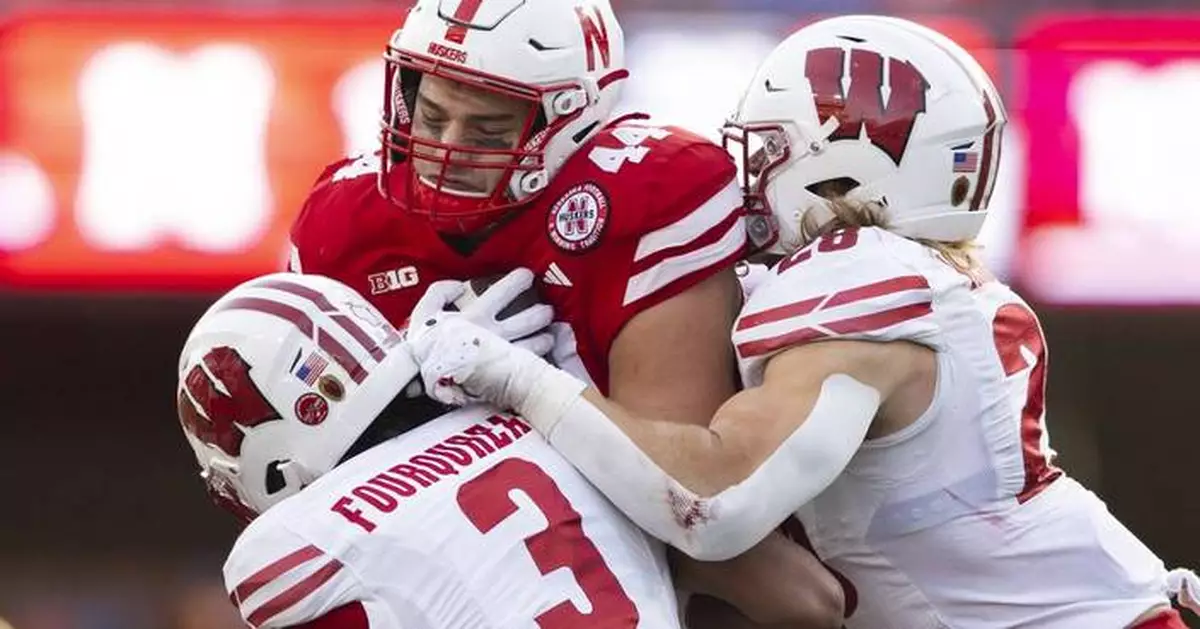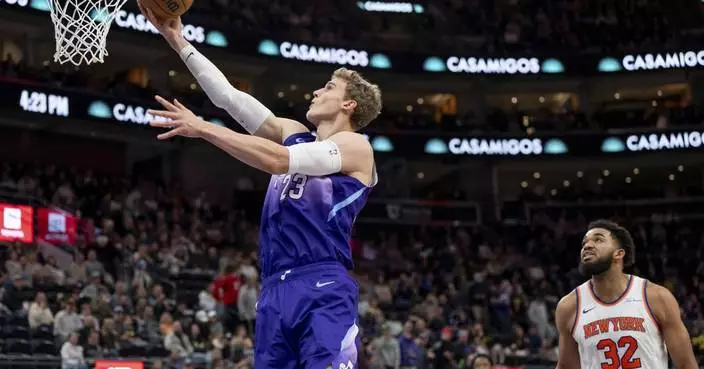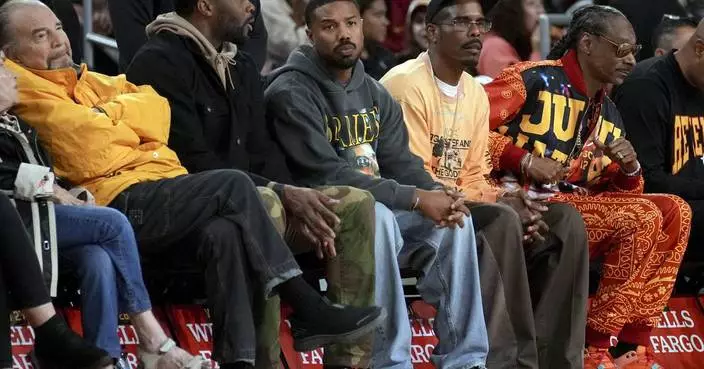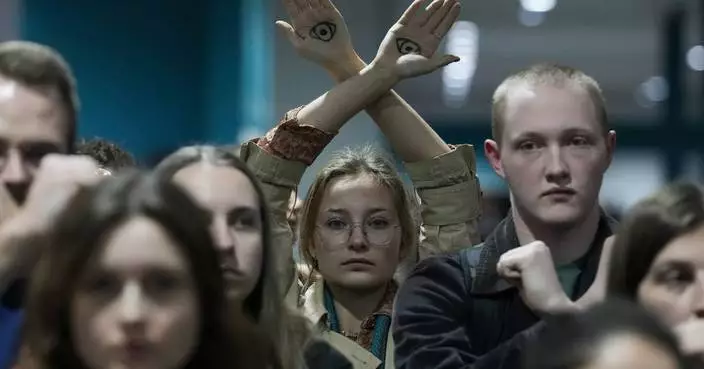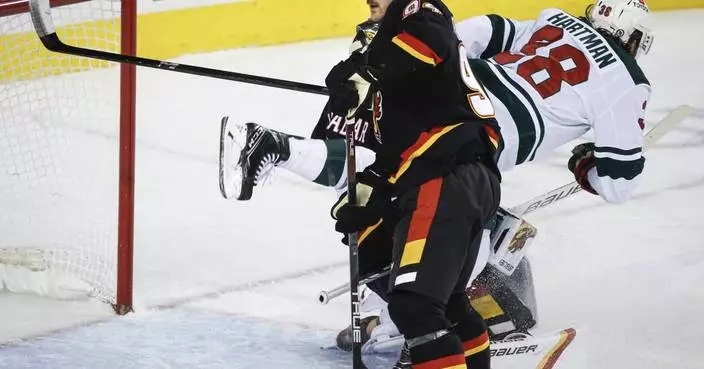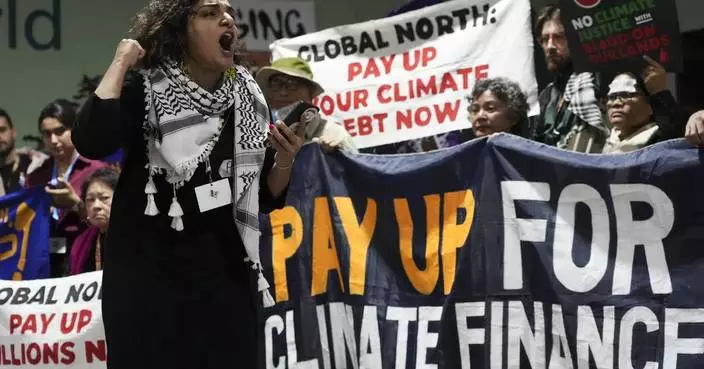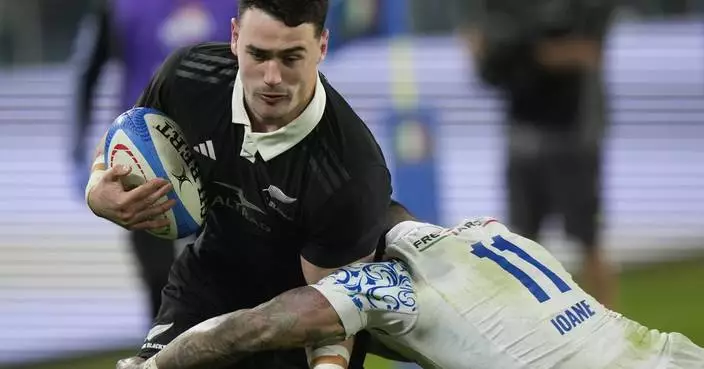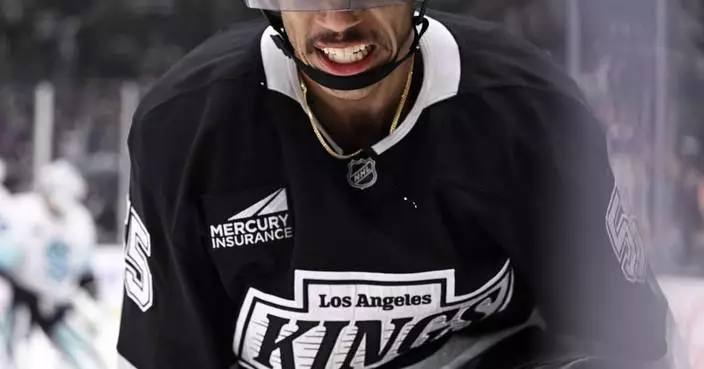LINCOLN, Neb. (AP) — Dylan Raiola threw for 293 yards and a touchdown, Dante Dowdell ran for three scores, and Nebraska beat Wisconsin 44-25 on Saturday to become eligible for a bowl for the first time since 2016.
Nebraska (6-5, 3-5 Big Ten) stopped a four-game losing streak and beat the Badgers for the first time in 11 meetings. The Cornhuskers sprinted to the Wisconsin sideline as time ran out to claim the Freedom Trophy as students poured out of the stands onto the field to celebrate.
The victory was the Cornhuskers' first in nine tries under second-year coach Matt Rhule when playing for bowl eligibility.
The Huskers came into the season with the longest bowl drought among power-conference teams and the program's longest since 1955-61.
“The cloud that kind of hangs over everything, it's gone,” said Rhule, who envisions bigger and better things for the Huskers. “This will be the last time we ever celebrate six wins.”
Wisconsin (5-6, 3-5) dropped its fourth straight game a week after it lost 16-13 to No. 1 Oregon, the Ducks' lowest point total of the season.
“We played really well against the No. 1 team in the country and then we come out today — and I'm not saying Nebraska is not a good program, but they're not No. 1 in the country — and we gave up three times the points to Nebraska," Badgers defensive lineman Ben Barten said. "This is on our defense today.”
Nebraska’s Emmett Johnson went over 100 yards for the first time in his 27 career games, finishing with 113 on 16 carries.
The Huskers, who last year squandered an early 14-0 lead at Wisconsin and lost 24-17, came away with points on six straight possessions before Raiola kneeled a couple times as the clock was running down at the end.
"I remember that feeling after going up 14-0 and not finishing that game," Johnson said. “Finishing has been an emphasis in the offseason, and that's what we did tonight."
Chants of “Go Big Red!” began echoing through Memorial Stadium late in the fourth quarter after Dowdell dived over the pile for his final touchdown, which gave Nebraska its most points in a game since 2021.
Raiola completed 28 of 38 passes, with eight going for at least 15 yards. His 5-yard TD pass to Jahmal Banks late in the second quarter helped the Huskers to a 24-10 halftime lead.
Braedyn Locke was 20 of 30 for 292 yards and three touchdowns. His fourth-quarter interception extended his streak of getting picked off at least once to eight games.
The loss came at the end of a tumultuous week for the Badgers. Coach Luke Fickell fired offensive coordinator Phil Longo on Sunday and held a contentious news conference two days later where he declined to say who would be the play-caller going forward. Tight ends coach Nate Letton called the plays against Nebraska, the Big Ten Network reported.
Wisconsin also was short-handed on both sides of the ball. Will Pauling, who leads the team in receptions, and safety Hunter Wohler, the top tackler, were held out with injuries.
“I don't have any excuses,” Fickel said. “We didn't play complementary football the way we have to on the road. It snowballed. We played really, really poor, especially tackling in the second half. We've got to challenge ourselves, look real deep in a short week and find out who's with us and who's willling to lay it all out on the line for these seniors coming up.”
Wisconsin: The Badgers will have to beat Minnesota in the battle for Paul Bunyan's Axe to avoid their first losing record since 2001 and an end to their 22-year bowl streak.
Nebraska: Dana Holgorsen, in his second game as offensive coordinator, effectively mixed the run and pass to keep the Badgers off-balance, and he got the Huskers' best playmakers more involved.
Wisconsin: hosts Minnesota on Friday.
Nebraska: at Iowa on Friday night.
Get poll alerts and updates on the AP Top 25 throughout the season. Sign up here. AP college football: https://apnews.com/hub/ap-top-25-college-football-poll and https://apnews.com/hub/college-football
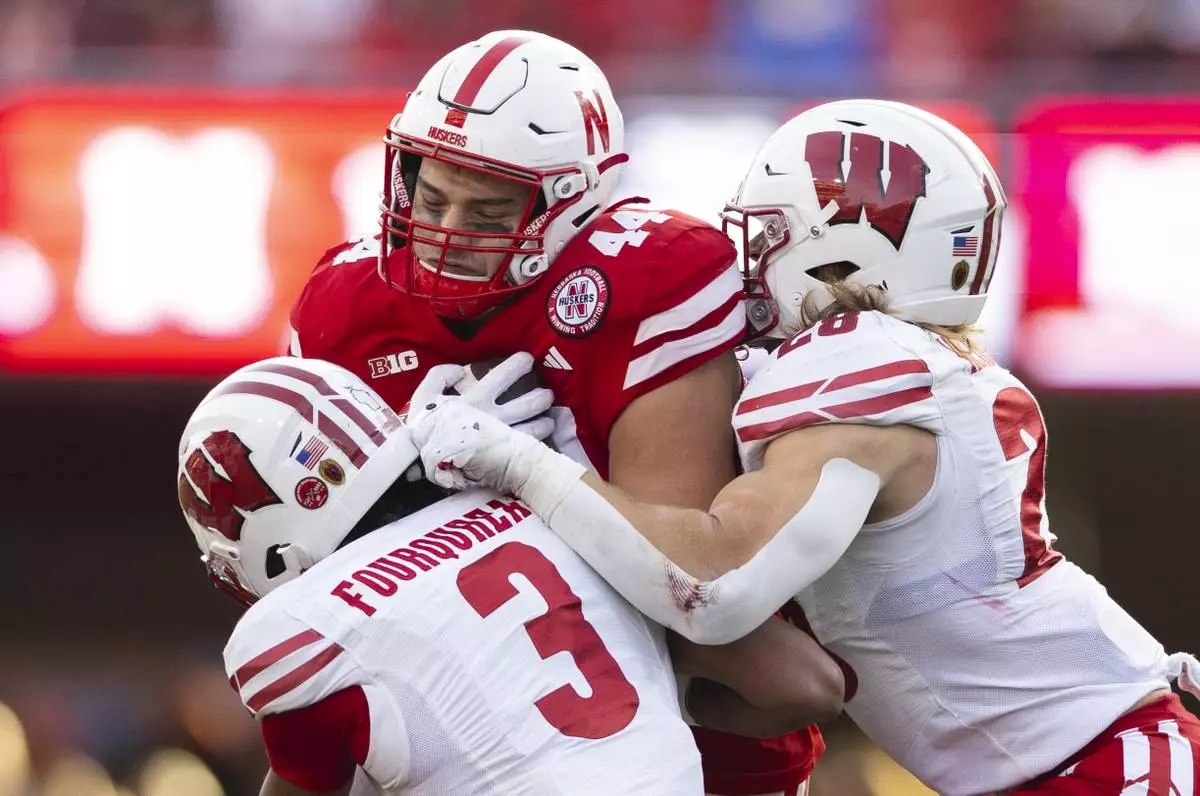
Wisconsin's Nyzier Fourqurean (3) and Christian Alliegro (28) tackle Nebraska's Luke Lindenmeyer (44) during the first half of an NCAA college football game Saturday, Nov. 23, 2024, in Lincoln, Neb. (AP Photo/Rebecca S. Gratz)
SADO, Japan (AP) — Japan will go ahead with a memorial ceremony on Sunday near the Sado Island Gold Mines, despite South Korea’s last-minute boycott of the event that highlighted tensions between the neighbors over the issue of Korean forced laborers at the site before and during World War II.
South Korea’s absence at Sunday’s memorial, to which Seoul government officials and Korean victims’ families were invited, is a major setback in the rapidly improving ties between the two countries, which since last year have set aside their historical disputes to prioritize U.S.-led security cooperation.
The Sado mines were listed in July as a UNESCO World Heritage site after Japan moved past years of disputes with South Korea and reluctantly acknowledged the mines’ dark history, promising to hold an annual memorial service for all victims, including hundreds of Koreans who were mobilized to work in the mines.
On Saturday, South Korea announced it would not attend the event, saying it was impossible to settle unspecified disagreements between the two governments in time.
Masashi Mizobuchi, an assistant press secretary in Japan’s Foreign Ministry, said Japan has been in communication with Seoul and called the South Korean decision “disappointing.”
The ceremony will be held as planned later Sunday at a facility near the mines.
The 16th-century mines on the island of Sado, off Japan’s north-central coast, operated for nearly 400 years before closing in 1989 and were once the world’s largest gold producer.
Historians say about 1,500 Koreans were mobilized to Sado as part of Japan’s use of hundreds of thousands of Korean laborers, including those forcibly brought from the Korean Peninsula, at Japanese mines and factories to make up for labor shortages because most working-age Japanese men had been sent to battlefronts across Asia and the Pacific.
Japan’s government has maintained that all wartime compensation issues between the two countries were resolved under a 1965 normalization treaty.
South Korea had long opposed the listing of the site as World Heritage on the grounds that the Korean forced laborers, despite their key role in the wartime mine production, were missing from the exhibition. Seoul's backing for Sado came as South Korean President Yoon Suk Yeol prioritized improving relations with Japan.
The Japanese government said Sunday’s ceremony was to pay tribute to “all workers” who died at the mines, but would not spell out inclusion of Korean laborers — part of what critics call a persistent policy of whitewashing Japan’s history of sexual and labor exploitation before and during the war.
Preparation for the event by local organizers remained unclear until the last minute, which was seen as a sign of Japan’s reluctance to face its wartime brutality.
Japan’s government said on Friday that Akiko Ikuina — a parliamentary vice minister who reportedly visited Tokyo’s controversial Yasukuni Shrine in August 2022, weeks after she was elected as a lawmaker — would attend the ceremony. Japan’s neighbors view Yasukuni, which commemorates 2.5 million war dead including war criminals, as a symbol of Japan's past militarism.
Ikuina belonged to a Japanese ruling party faction of former Prime Minister Shinzo Abe, who led the whitewashing of Japan's wartime atrocities in the 2010s during his leadership.
For instance, Japan says the terms “sex slavery” and “forced labor” are inaccurate and insists on the use of highly euphemistic terms such as “comfort women” and “civilian workers” instead.
South Korean Foreign Minister Cho Tae-yul said Saturday that Ikuina’s Yasukuni visit was an issue of contention between the countries’ diplomats.
“That issue and various other disagreements between diplomatic officials remain unresolved, and with only a few hours remaining until the event, we concluded that there wasn’t sufficient time to resolve these differences,” Cho said in an interview with MBN television.
Some South Koreans had criticized Yoon’s government for supporting the event without securing a clear Japanese commitment to highlight the plight of Korean laborers. There were also complaints over South Korea agreeing to pay for the travel expenses of Korean victims’ family members to Sado.
Kim reported from Seoul, South Korea.
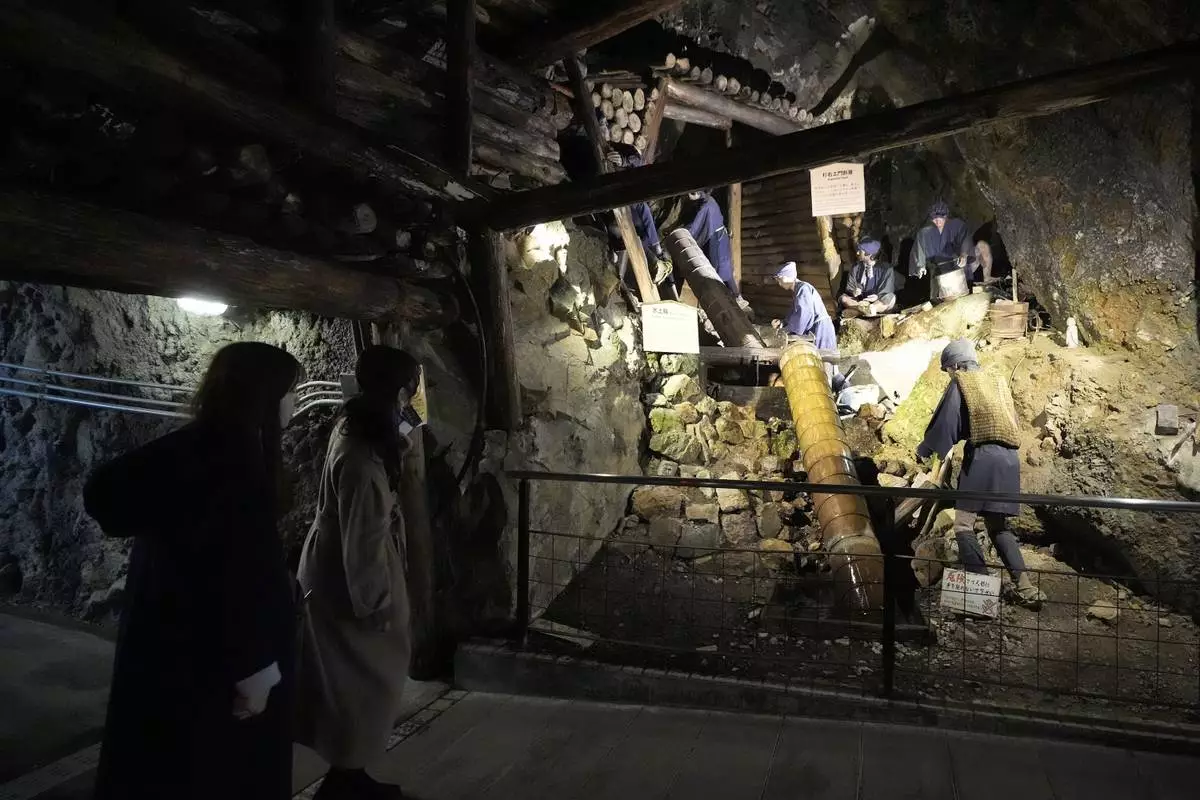
Visitors look at display at Sado Kinzan Gold Mine historic site in Sado, Niigata prefecture, Japan, Saturday, Nov. 23, 2024. (AP Photo/Eugene Hoshiko)



